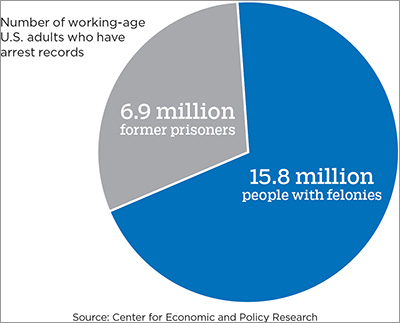The construction industry, indeed the entire U.S., is struggling to fill jobs as the unemployment rate dipped to 4.4 percent in April—the lowest it's been since the Great Recession. (The federal government considers full U.S. employment to be 4.7 percent.)
Yes, employing immigrant labor is one option though hiring foreign workers places multiple paperwork burdens on employers plus other hurdles to clear, such as language barriers. Instead, according to the Center for Economic and Policy Research, more employers are actively recruiting and hiring those with criminal records.
In fact, according to Bloomberg BNA, a medium security prison in Sheridan, Ill., has been training inmates in carpentry and plumbing skills. And the Association of Chamber of Commerce Executives and the Council of State Governments Justice Center jointly agreed to help chamber members hire ex-offenders.
The numbers are astounding. According to the Center for Economic and Policy Research, there are between 14 million and 15.8 million working-age people with felony convictions and 70 million with an arrest or conviction record. And Evanston, Ill.-based Northwestern University's Kellogg School of Management reports 650,000 prisoners are set free annually in the U.S.

Number of working-age U.S. adults who have arrest records |
When asked about hiring those with criminal records, National Association of Home Builders CEO Gerald Howard told Bloomberg BNA: "We have a huge labor shortage. This has become a focus out of necessity."
As an added perk, employers that hire and retain ex-felons are offered a federal Work Opportunity Tax Credit. (The same tax credit applies to those who hire and retain veterans.)
And research conducted by Northwestern University showed ex-offenders are no more likely to be fired than non-offenders after being hired. In addition, the research showed ex-offenders were much less likely to quit a job than non-offenders.
With a historically tight job market, you might need to get creative with your hiring policies. And as you explore your hiring options, keep in mind Equal Employment Opportunity guidelines and protections apply when hiring ex-offenders just as they would with any other job candidate.
Ambika Puniani Bailey is editor of Professional Roofing and NRCA's vice president of communications and production.



